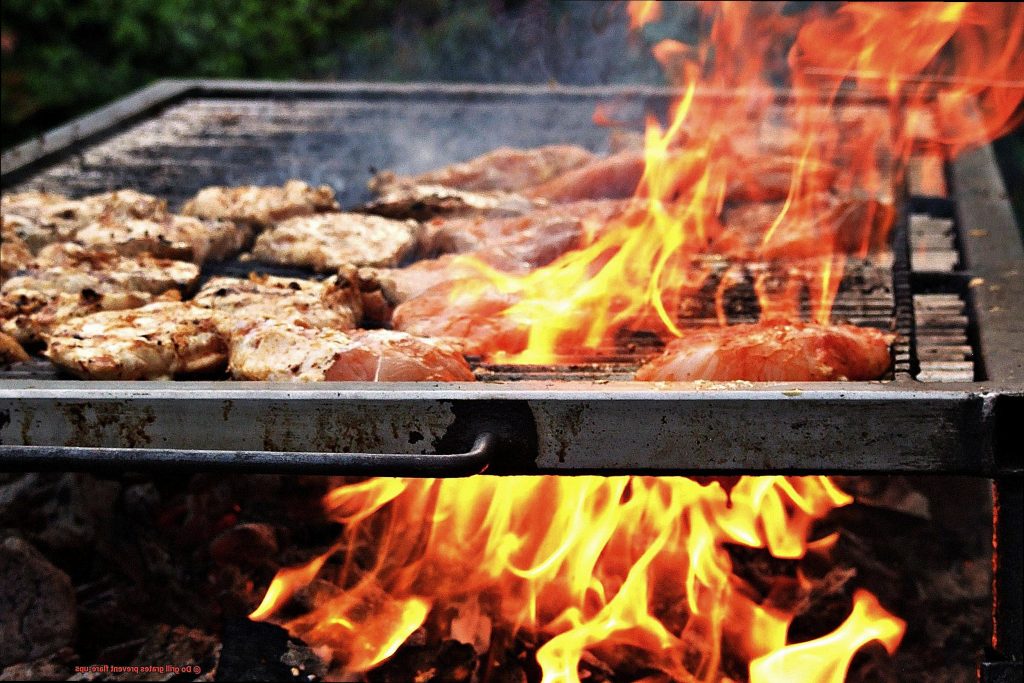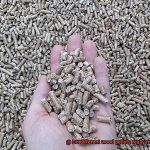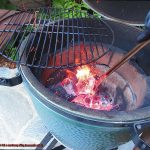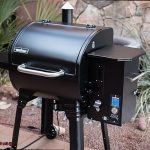It’s that time of year again – grilling season is in full swing. The tantalizing aroma of juicy burgers and perfectly cooked steaks wafts through the air, but unfortunately, so do those pesky flare-ups. If you’re tired of your cooking experience being hindered by flare-ups, you may have heard that grill grates are the solution. But do they really work?
In this post, we’ll get into the nitty-gritty of flare-ups and how grill grates can help prevent them. We’ll explore the various types of grill grates available today and what makes them effective at reducing flare-ups. Plus, we’ll share some tips and tricks to ensure your food is cooked to perfection without any unwanted flare-ups.
But before we dive into all that, let’s start with the basics: what exactly is a flare-up, and why does it happen? Whether you’re a seasoned pro or a newbie to the grilling game, understanding the science behind flare-ups is key to mastering your craft. So grab yourself a cold one and join us on this journey through the world of grill grates and flare-ups.
Contents
What are Grill Grates?
One of the most important tools in your grilling arsenal is the grill grate. But what exactly are grill grates, and why are they essential for a successful BBQ?
Grill grates are metal surfaces made of materials such as stainless steel or cast iron. They’re placed over the heat source of your grill and act as a cooking surface for your food. These grates come in various shapes and sizes, depending on the type of grill and the food you want to cook. You can find flat-surfaced grates for cooking delicate items like fish or reversible ones with both flat and raised ridges for creating those classic grill marks on meat.
One primary function of grill grates is to distribute heat evenly across the cooking surface. This ensures that your food is cooked thoroughly without any hot spots that might cause it to burn or cook unevenly. Additionally, many grill grates are designed to create a sear on food, which not only adds flavor but also helps to lock in juices and prevent drying out.
Another significant benefit of using grill grates is their ability to prevent flare-ups. Flare-ups occur when fat drips from your meat onto the hot coals or burners, causing flames to shoot up and potentially becoming dangerous. But with raised ridges on grill grates, the fat can drip down into the valleys away from direct heat, reducing the likelihood of flare-ups.
However, it’s worth noting that grill grates aren’t foolproof. Flare-ups can still occur if there is excessive grease buildup on the grill grates or when cooking fatty cuts of meat that produce a lot of dripping fat. Therefore it’s crucial to monitor your grill closely and be prepared to move your food away from any flames if necessary.
How Do Grill Grates Help Prevent Flare-Ups?
Grill grates are the unsung heroes of BBQ, playing a crucial role in preventing the dreaded flare-ups that can ruin your cookout. But how exactly do they work their magic?
Firstly, grill grates create a barrier between the food and the flames. This barrier allows for proper airflow, reducing the likelihood of flare-ups and giving you peace of mind while you focus on cooking your food to perfection.
Secondly, grill grates catch excess grease and juices that may fall from the food. This not only helps prevent flare-ups but also makes cleaning up after your cookout a breeze. No more scrubbing away at stubborn grease stains.
Thirdly, grill grates allow you to control the heat. By adjusting the distance between the food and the flames, you can reduce the likelihood of flare-ups. This means that you can move your food to a cooler part of the grill or raise it higher above the flames if you notice it starting to char or burn.
But not all grill grates are created equal. Using high-quality materials like stainless steel or cast iron can make all the difference in preventing flare-ups. These materials can withstand high temperatures without warping or cracking and provide a durable surface for your cooking needs.
Are Grill Grates Foolproof Against Flare-Ups?
Grilling is an art form that requires more than just a grill and some food. To achieve the perfect grilled dish, you need a clean and well-maintained grill with high-quality grill grates. But are these grill grates foolproof against flare-ups? Unfortunately, the answer is no.
While grill grates play a crucial role in preventing flare-ups, they cannot guarantee that they won’t happen. Flare-ups occur when fat or grease from your food drips onto the hot coals or burners, causing flames to shoot up towards your food. Although grill grates allow excess grease and fat to drain away from your food, they cannot entirely prevent flare-ups.
So, what can you do to minimize the risk of flare-ups? Here are some tips:
- Keep your grill clean and well-maintained: Regularly clean the grates and remove any leftover food debris or grease buildup. This will promote even heat distribution and prevent your food from sticking to the grates.
- Use lean cuts of meat and trim visible fat: This will reduce the amount of fat dripping onto the heat source and decrease the likelihood of flare-ups.
- Use a drip pan: Consider using a drip pan to catch excess grease and prevent it from dripping onto the heat source. This is particularly useful when grilling fatty cuts of meat or cooking with marinades that contain oil.
By taking these additional steps, you can minimize the risk of flare-ups and ensure a safe and enjoyable grilling experience. Remember, grill grates are essential but not foolproof against flare-ups.
What Factors Can Increase the Risk of Flare-Ups?
Grilling is a beloved tradition, but it can also be a risky endeavor if you’re not careful. One of the most significant risks associated with grilling is flare-ups, which can ruin your meal and pose a serious safety hazard. So, what factors can make these sudden bursts of flames more likely?
First and foremost, the type of food you’re cooking plays a significant role. Fatty meats like hamburgers and sausages have a high fat content that can drip onto the flames and cause flare-ups. To reduce this risk, consider choosing leaner cuts of meat or trimming any visible fat before grilling. Additionally, marinades or sauces that contain sugar or other sweeteners can also increase the likelihood of flare-ups.
The type of grill you’re using is another important factor to consider. Gas grills are more likely to experience flare-ups than charcoal grills because they can reach higher temperatures. However, regular cleaning of the grill grates is necessary for both types of grills to prevent grease and debris buildup that can increase the risk of flare-ups.
Finally, cooking at a higher temperature can cause fats to melt and drip onto the flames, leading to flare-ups. It’s essential to monitor the cooking temperature and adjust as needed to prevent excessive heat and flare-ups.
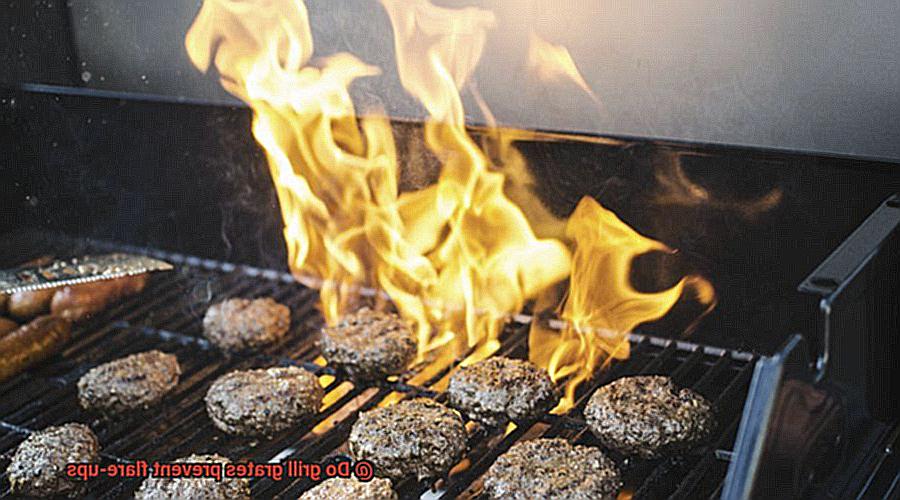
How to Properly Use and Maintain Grill Grates for Optimal Performance
Grilling is a beloved pastime for many, but it’s important to take precautions to prevent flare-ups and ensure a safe and enjoyable experience. Grill grates are vital components of any grill system, and they play a crucial role in preventing flare-ups during cooking. Here are five tips for properly using and maintaining grill grates for optimal performance:
Preheat the Grill Grates
Before placing any food on the grates, it’s essential to preheat them properly. Preheating helps to burn off any remaining food particles or debris from previous use, ensuring that the grates are clean and ready for the next use. It also helps to prevent sticking and ensures that the food is cooked evenly.
Choose the Right Foods
Certain foods tend to cause flare-ups more than others. Foods that are high in fat or have a lot of marinade or sauce can cause excess fat and liquids to drip onto the flames, leading to flare-ups. To prevent this, consider trimming excess fat before cooking and using lighter marinades or sauces.
Regularly Clean Your Grill Grates
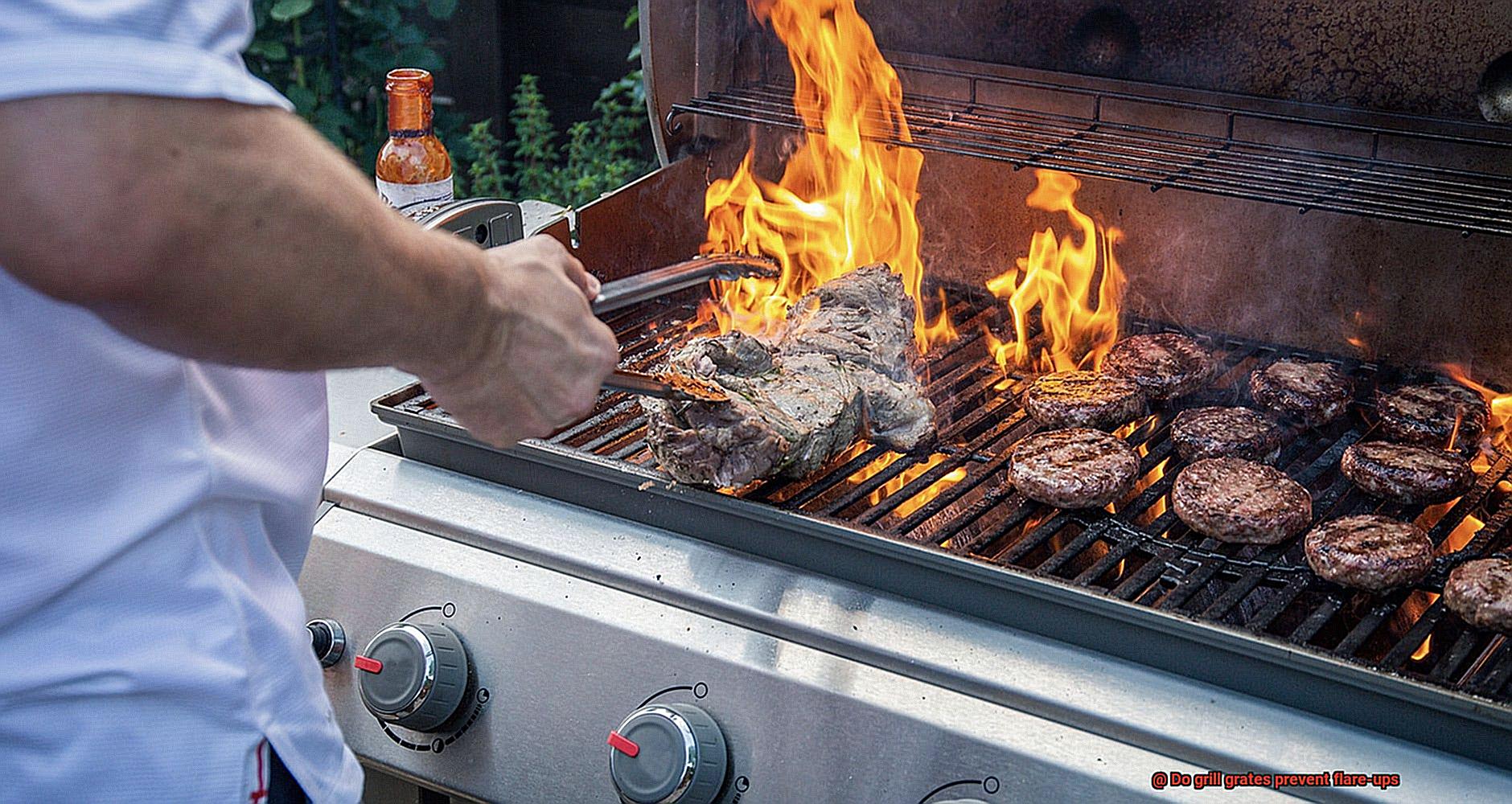
After each use, clean the grill grates thoroughly with a brush or scraper to remove any remaining food particles or debris. This not only ensures a clean surface for the next use but also prevents grease buildup, which can lead to flare-ups.
Oil the Grates
Oiling your grill grates before cooking can significantly reduce flare-ups. Use a brush or paper towel to apply a thin layer of cooking oil on the grates before placing your food on top. The oil forms a barrier between the food and the grates, reducing direct contact and minimizing the chances of flare-ups.
Use High Smoke Point Oil
When oiling your grill grates, it’s essential to use high smoke point oil such as vegetable oil or grapeseed oil. These oils can withstand high temperatures without smoking or burning, ensuring a safe and enjoyable grilling experience.
Benefits of Using Grill Grates
As a grill master, you know that the perfect grilling experience requires more than just a great cut of meat. The right tools can make all the difference, and that’s where grill grates come in. These unsung heroes offer a range of benefits that can take your grilling game to the next level.
Firstly, grill grates provide better heat distribution. With even heat distribution, flare-ups are minimized. The grates regulate the flow of air and heat, preventing hot spots and ensuring your food is cooked thoroughly without getting burnt or undercooked.
Reduced fat drippings are another benefit of using grill grates. When fat from meat drips onto hot coals or flames, it can cause flare-ups. Grill grates with wider spacing allow for some of the fat to drip through, reducing the amount of fat that accumulates and decreasing the likelihood of flare-ups. This means you can cook fatty meats without worrying about them causing a mess on your grill.
Moreover, grill grates offer an increased flavor profile. The wider spacing allows for more smoke and flame contact with the food, enhancing its flavor. The smoke and flames add a unique char and smoky flavor to your food, making it even more delicious.
Finally, cleaning your grill grates is a breeze. They can be scrubbed with a grill brush to remove any excess food or debris, making them ready for use next time. No need to worry about using harsh chemicals or spending hours cleaning your grill after a long day of cooking.
Common Mistakes When Using Grill Grates
Grilling is an art form that requires the right tools and techniques to turn ordinary food into a mouthwatering masterpiece. One of the most important tools in your grilling arsenal is your grill grates. However, even experienced grillers can make common mistakes when using grill grates that can lead to flare-ups, ruining your food and putting your safety at risk. Fear not, as an expert on this topic, I am here to guide you through the do’s and don’ts of using grill grates.
First things first, let’s talk about why grill grates are so crucial to achieving that perfect sear and flavor. Grill grates help distribute heat evenly, reduce fat drippings, enhance the flavor profile of your food, and make cleaning a breeze. But if not used correctly, they can also cause flare-ups. So, what are some of the most common mistakes people make when using their grill grates?
Mistake #1: Neglecting to clean the grates
Cleaning your grill grates may not be the most exciting part of grilling, but it is essential to avoid flare-ups. When leftover food and grease build up on the grates, they become a fire hazard and can ruin the taste of your food. Be sure to clean your grill grates before and after each use.
Mistake #2: Overcrowding the grates
It’s tempting to try to cook everything at once, but overcrowding your grill grates with too much food can cause fat from the food to drip onto the flames, creating flare-ups. Give each piece of food enough space on the grill for even cooking.
Mistake #3: Using too much oil
Using oil on your food can prevent it from sticking to the grates. However, using too much oil can cause flare-ups. Use a light coating of oil or cooking spray to prevent sticking without causing flare-ups.
Mistake #4: Not preheating the grill
Preheating your grill is essential to ensure even cooking and prevent flare-ups. If you put food on a cold grill, it can cause fat from the food to drip onto the flames, leading to flare-ups.
The Best Types of Grill Grates for Preventing Flare-Ups
Grilling is a summer tradition that many people look forward to, but nobody wants to deal with dangerous flare-ups. The type of grill grate you use can make all the difference in preventing these flare-ups and keeping your food safe. Here are some of the best types of grill grates to consider:
Stainless steel grates are a top choice for preventing flare-ups. They’re durable, easy to clean, and can heat evenly, which helps to prevent hot spots that can cause flare-ups. Plus, their non-stick properties make them great for cooking delicate foods like fish or vegetables without worrying about them sticking to the grill. With stainless steel grates, you can enjoy a smooth grilling experience without worrying about flames ruining your food.
Cast iron grates are another excellent option for preventing flare-ups. Cast iron is known for its heat retention properties, which means that it can get very hot and stay hot for a long time. This can help sear meat quickly and evaporate any excess moisture on the surface of the meat, both of which can help prevent flare-ups. Plus, cast iron grates give your food those classic grill marks that everyone loves.
Ceramic grates are a newer option on the market, but they’re quickly gaining popularity for their ability to prevent flare-ups. They’re non-stick and distribute heat evenly across the surface of the grate, which means there are no hot spots where flare-ups can occur. Plus, they’re easy to clean and maintain, making them a great choice for busy grillers who want a hassle-free experience.
Porcelain-coated grates are also an option for preventing flare-ups. They have a smooth, non-stick surface that’s easy to clean, and they distribute heat evenly. However, they can be fragile and may chip or crack over time, so they may not be the best choice if you’re looking for something that will last for years.
NLlxUnZcVoc” >
Conclusion
In conclusion, grill grates are a must-have tool for any grilling enthusiast looking to prevent flare-ups. With their ability to distribute heat evenly, catch excess grease and juices, and provide better temperature control, grill grates are an essential ingredient for successful grilling. However, it’s important to note that they’re not entirely foolproof against flare-ups and require proper maintenance and usage to maximize their effectiveness.
To avoid flare-ups when using grill grates, it’s crucial to keep them clean by scrubbing away any leftover food or debris after each use. Additionally, choosing lean cuts of meat and using a drip pan can further reduce the risk of flare-ups. When selecting grill grates, high-quality materials like stainless steel or cast iron can make all the difference in preventing flare-ups.
It’s also important to avoid common mistakes when using grill grates such as overcrowding them with too much food or using too much oil. Preheating the grill is another crucial step in preventing flare-ups.
When it comes to choosing the right grill grate for preventing flare-ups, options like stainless steel, cast iron, ceramic, and porcelain-coated grates are all effective choices. Each has its own unique benefits that can enhance your overall grilling experience.
By understanding how grill grates work and taking proper precautions when using them, you can enjoy a safe and stress-free grilling experience without worrying about pesky flare-ups ruining your meal.

